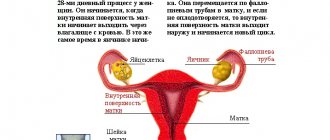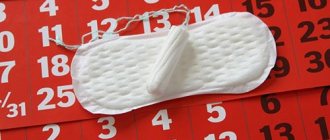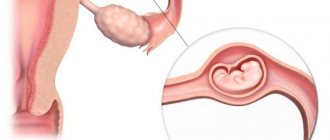How to understand that your period is about to start
More often, harbingers for each woman and girl are an individual concept and require a conscious approach.
By listening to yourself and your body’s reactions, you can easily determine not only an approximate time period, but also a specific day and even hour. Changes in the mammary glands, processes occurring in the uterine cavity and in the ovaries will not go unnoticed if we understand what to expect and what will be the first bell. Typically, the onset of the inevitable process falls during the last phase of the menstrual cycle (MC), but sometimes it affects the entire second half. Usually, shortly before the onset of your first period, leucorrhoea appears - a light discharge from the vagina that you can notice on your underwear. This discharge is normal and its appearance simply means that your body is maturing. Your period will likely begin a year or two after those first period signs appear.
Read more in the article “Leucorrhoea”
There are several other menstrual symptoms that indicate that menstruation will occur literally in the coming days. However, they usually do not appear immediately, but after the menstrual cycle has established itself (about a year after the first period). These are symptoms such as:
- aching, nagging pain in the lower back or lower abdomen,
- slight enlargement and tenderness in the chest,
- mood changes (tearfulness, aggressiveness or irritability).
Such symptoms are commonly called premenstrual syndrome (PMS). Don't worry, all these unpleasant period symptoms are pretty easy to deal with. Our “Tips for Feeling Better During Your Period” might help you.
https://youtu.be/yVqw3l8HatY
The main symptoms of approaching menstruation
There are a number of harbingers by which any girl will understand that her period will soon begin. Each organism will have them individually, with varying degrees of severity. Therefore, it is worth monitoring which signs appear more clearly and which are mild or unnoticeable. It is also important to understand what specific day they occur. This way you can calculate your individual menstrual schedule literally down to the day or even the hour.
So, how do you know when your period is about to start? Main symptoms:
- Enlargement and engorgement of the mammary glands. Nagging pain, itching and tingling in the chest. There may be clear discharge from the nipples, which later curdles. The reaction of the glands to hormonal changes is different for each girl. The soreness should resemble the first sensations of breast growth in adolescence. Therefore, if you experience severe or acute pain in the chest, you should consult a gynecologist to prevent dangerous diseases.
- There is a nagging pain in the lower abdomen, radiating to the lower back. Swelling of the abdomen. This occurs because a layer of epithelium in the uterus breaks away. Acute painful sensations can occur in the last three days before menstruation, but it all depends on the characteristics of the body and the pain threshold of the woman. Some feel no pain at all, and note a slight stretching and discomfort in the lower abdomen.
- Rash on face. It occurs mainly in adolescence, but also occurs in adult women with oily skin. This reaction is caused by a change in hormonal levels in the second half of the cycle.
- Intestinal disorder. When the endometrium is separated, the uterus swells, puts pressure on the intestinal walls and this contributes to more frequent bowel movements. The general metabolic process also affects during this difficult period. The body experiences stress and tries to get rid of everything unnecessary.
- Psychological discomfort, irritability. This difficult condition is called premenstrual syndrome (PMS). It does not occur in every girl, but only in 5% of the fair sex. It manifests itself in the form of nervousness, sudden mood swings, tearfulness, headaches, dizziness and general weakness in the body.
Asymptomatic premenstrual period
For women whose premenstrual period does not have any clinical symptoms, and there are no signs that menstruation will begin soon, the only way out is to keep a calendar of critical days and monthly monitoring of the duration of the menstrual cycle. Thus, the onset of menstruation will be expected and will not bring any inconvenience.
Now you know how to understand that your period is about to start. Don’t get sick, and let your critical days become just a physiological process for you, and nothing more.
First of all, it’s worth talking about them, since they are the most striking symptoms before menstruation. Over the course of several days, when the onset of menstruation is expected, a girl or woman may observe:
- increased appetite;
- mood changes;
- desire to eat sweets.
Another common symptom is insomnia. This is explained by the release of large amounts of hormones. Mental instability is also a symptom.
Premenstrual syndrome is a clinical symptom. This is fine. Among the main signs:
- pain in the lower abdomen or lower back;
- increased appetite;
- temperature increase;
- fatigue, drowsiness.
During the period when menstruation is planned, the breasts may also hurt, as the mammary glands become more sensitive. Good symptom. If wearing a bra causes discomfort, it is most likely a sign of premenstrual syndrome. Also, the breasts become enlarged - another sign.
You can tell that your period is about to begin by looking at your discharge, so it is recommended to examine it first rather than pay attention to the symptoms. As menstruation approaches, the discharge becomes white or brown in color and has a sour odor.
Also a clear sign is their quantity - there is more discharge. However, it is worth noting that if the white or brown discharge is profuse and the woman feels a burning or itching sensation in the groin area, this is not a symptom. In this situation, this is a sign of microflora disturbance, and it is recommended to visit a gynecologist as soon as possible.
Among the common signs are the harbingers of menstruation:
- nausea;
- dizziness;
- fatigue and apathy.
Women are also susceptible to panic attacks during this period. A clear sign is that they are restless, their emotional state becomes unstable.
What is the menstrual cycle?
A woman's menstrual cycle is on average 28 days. Menstruation can begin 21-35 days after the last menstruation, which will not be considered a pathology or deviation from the norm. Calculating the cycle is simple: from the first day of menstrual bleeding, ending with the first day of discharge in the next month. To understand when the critical days will begin, you need to understand the internal processes that occur every month in the girl’s body.
Gynecologists usually divide the menstrual period into four phases. Let's consider each stage separately:
- First phase. Lasts on average 5 – 7 days from the start of bleeding. At this time, the concentration of progesterone (the female sex hormone responsible for pregnancy) decreases. If conception does not occur, the process of epithelial detachment in the uterus begins. When the epithelium separates, the vessels burst, which causes pain in the lower abdomen. At the same time, the hypothalamus (the part of the brain that regulates the release of hormones in the body) gives the command to prepare a new egg. The production of another female hormone, estrogen, necessary for the next stage, will immediately begin.
- Second phase (from 5 to 14 days). Your period ends, but mucus continues for a few more days. These two to three days are the lowest chance of getting pregnant. From the 10th day of the cycle, the concentration of estrogen increases rapidly. Under the influence of this hormone, the follicle in the ovary ruptures and a mature egg is released. Now the time has come for possible conception. The rupture of the follicle wall itself can be felt by a woman with mild pain in the iliac region.
- Third phase (from 15 to 23 days). The egg moves slowly through the fallopian tubes, awaiting fertilization. If conception does not occur, the concentration of estrogen gradually decreases. The remains of the follicle turn into the corpus luteum - the source of the hormone progesterone. He, in turn, starts the processes of the last phase of the reproductive cycle.
- Fourth phase (from 23 to 28 days). It is during these days that the girl feels discomfort and pain. At the last stage, progesterone promotes the rejection of the epithelium from the inner walls of the uterus, which comes out in the form of dark clots from the vagina. With the onset of discharge, a new menstrual period begins.
In the last 7 days of the cycle, the woman’s genitals are tense and painful, and the mammary glands swell under the influence of progesterone. All these are clear signs that critical days will begin soon.
Harbingers of menstruation
It is quite simple to understand that your period will soon come, knowing some of the characteristics of your own body, and the intensification of certain symptoms will help you determine the time intervals.
- Swelling of the mammary glands - their increase in size, engorgement, painful manifestations. Light discharge from the nipples is possible, which is often noticeable in the form of already curdled secretion.
- Nagging pain in the lower abdomen - preparation of the uterus for the rejection of its inner layer (endometrium) is often accompanied by pain, expressed to a greater or lesser extent depending on the individual characteristics of the body. Pain may be associated with hormonal disorders, and therefore require observation and consultation with a gynecologist.
- Skin rashes are not a necessary but common symptom associated with hormonal changes.
- Lower back pain is a manifestation of changes in the uterus.
- Bowel movement is a normal reaction of the body in which metabolism is not impaired. During the period before menstruation, the body gets rid of everything unnecessary, including the smooth muscles of the intestines. In some cases, pain before menstruation is associated precisely with intestinal congestion, and the discomfort disappears with bowel movement.
There are also subjective harbingers of menstruation. These include an increase in appetite, some experience swelling of the legs and face, many complain of a state close to depression, and a general violation of moral stability or premenstrual syndrome (PMS).
Painful periods
Women for whom menstruation is not only monthly changes in the body, but also constant pain, need to consult an obstetrician-gynecologist. An important step will be not only the disappearance of pain, but also the determination of their causes. The most common method of normalizing the entire MC is the prescription of hormonal contraceptives. For those who want to get rid of the main symptoms, the ideal option would be to use oral antispasmodics (No-spa) or topical use of rectal suppositories with papaverine.
Concept of premenstrual syndrome
Men deny it, women claim that they experience its effects on themselves. Controversial in its existence, PMS helps many representatives of the fair sex find the answer to the question: “How to understand that your period will begin soon?” Scientists who study this issue not only confirm its existence, but also divide it into several types. Signs that your period is about to start:
- Neuropsychic appearance - accompanied by irritability, tearfulness, and depressive states. Women either feel weak or behave aggressively. Rapid changes in symptoms are considered normal and do not relate to disorders of consciousness.
- Edema appearance - manifested by swelling of the mammary glands, swelling of the arms, legs, face, bloating, and general weakness of the body.
- Cephalgic appearance - women complain of increased headache, dizziness, and attacks of nausea. With this type of PMS, signs of depression are more likely to appear, as well as complaints about deteriorating health.
A woman cannot control her mood on her own, since it does not depend on her. Everything happens due to a hormonal surge. However, if desired, the effects of PMS can be mitigated.
For example, to calm down and relieve irritability, doctors recommend that a woman take a bath filled with:
- essential oils;
- salt;
- foam.
When using essential oils, the optimal amount is 2 drops per bath, maximum 5. Aromatherapy will also be useful. In this case, up to 15 drops of essential oil can be used to fumigate a standard room with an area of 9 to 15 square meters. Preferred scents:
- orange;
- lavender;
- bergamot.
Too sweet or cloying odors should not be used, as they can cause nausea and worsening the condition. If you can’t cope with an emotional outburst, and you’re restless, it’s better to start staying at home.
In what cases is it necessary to see a doctor?
Women mistake some symptoms of serious illnesses for signs of upcoming menstruation.
What should you be wary of?
- Sharp pain in the lower abdomen may indicate the development of a tumor, infection, or the onset of endometriosis.
- Pain in the chest - there may be diffuse mastopathy (formation of nodules in the mammary glands).
- Transparent discharge indicates the possible development of cervicitis, endometritis or cervical erosion.
- Brown discharge causes polyps and endometriosis.
https://youtu.be/y8f7PHBMXp0
Nervous breakdowns before menstruation do not always mean PMS, but may indicate a serious hormonal imbalance in a woman.
Even a developing pregnancy in the first weeks can give the same symptoms as the upcoming menstruation. Therefore, any alarming factors should be a reason to contact a gynecologist.
How can you tell if your period is about to start? There are several signs.
Often the signs before menstruation turn out to be false. For example, due to a lack of vitamins and sleep, girls begin to feel the listed symptoms. However, my period seemed to have recently ended. They may not come at all, because it is too early.
To understand how long your next menstruation is, you can do a pharmacy ovulation test. It is recommended to buy it after 11-14 days from the start of the last menstruation. It is better to buy several tests at once and monitor their results when the 11th day arrives.
The test will help determine when ovulation is approaching. If it turns out to be positive, it is worth counting down two weeks - this is the date on which your period is planned.
Don't worry if your period is late by 2-5 days. The state of the body is influenced by many factors, among which we can even mention climatic conditions. Delaying a woman’s period is justified if:
- severe shocks;
- fasting, strict diets;
- sleepless nights;
- changes in climatic conditions.
Also, the cycle may change due to the onset of a new season - spring, summer, autumn, winter.
How to avoid getting into trouble
It is very easy to fall into a stupor and become confused if a girl’s first period begins unexpectedly for her and at the most inopportune time. First of all, don't worry. You can feel confident if you use panty liners on a regular basis. They will protect your clothes from the unexpected appearance of discharge and, therefore, feel much more at ease.
Considering that pads or ordinary tampons can be carried with you always and everywhere, this will allow the girl to be constantly ready for the start of the menstrual period in any situation and, if necessary, quickly resort to using these hygiene products.
The first menstruation, as a rule, is accompanied by real excitement among growing ladies. Here is a list of simple tips that will help you not fall into a state of panic when the first critical days arrive:
- Keep a menstruation calendar.
- Use pads daily during periods when discharge may appear.
- If, however, the discharge started for the first time and took you by surprise, and you don’t have any tampons or pads with you, you can turn to a friend, school teacher or nurse. They definitely have hygiene products.
- On the day when bleeding may begin, you should visit the toilet approximately once every 3 or 4 hours so as not to miss the onset of bleeding.
- Just in case, on the days when your first period begins, you can put a spare pair of underwear in your purse, in addition to pads or tampons.
If you use at least some of these tips, the likelihood that your first menstruation will go smoothly increases significantly. Fortunately, all this is not at all difficult .
What happens to the ovaries before menstruation
Before menstruation, the ovaries undergo characteristic changes associated with MC. In the body of a healthy woman they are unchanged and occur according to a certain scenario. Approximately in the middle of the cycle (days 13-16), a mature egg leaves the ovary, first forming a protrusion, which during ultrasound diagnostics looks like a functional cyst.
When the wall of the ovary bursts and the egg comes out, many women feel pain in the right or left iliac region. At the site where the egg is released, the corpus luteum forms, producing the pregnancy hormone progesterone, which stimulates the thickening of the endometrium and makes it prepared for the attachment of a fertilized egg.
Painful sensations in the ovarian area during menstruation are considered pathological and require consultation.
Determining the start date of menstruation
Let's take a closer look at how to understand that your period will start soon. The menstrual cycle is divided into 4 stages.
- From 1 to 5 days . Against the background of a decrease in the level of progesterone in the bloodstream, epithelial detachment in the uterus occurs, which causes the onset of discharge. At this moment, the appearance of a follicle is noted, which participates in the formation of an egg.
- From 5 to 14 days . I don't have my period at the moment. Blood clots are removed through the cervical canal. Estrogen levels are increased, which causes the follicle to open. At this time, the eggs are located in the fallopian tubes, where fertilization can occur.
- 15-23 days . In the absence of conception, estrogen levels decrease. The appearance of the devastated follicle becomes similar to the corpus luteum, responsible for the development of progesterone.
- 23-28 days . Women need the presence of progesterone in order to carry a baby to term and to give birth in the future.
In the case where conception does not follow, the woman will soon notice the presence of precursors heralding the onset of regulation - the removal of dead cell tissue from the uterine mucosa. At this time, slight discomfort appears, expressed in the form of certain symptoms. Guided by these signs, you can find out when your period will begin.











